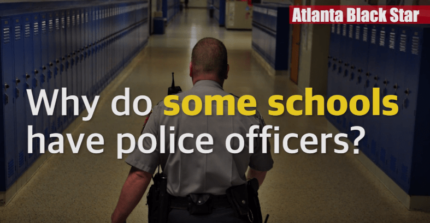After an investigation by the U.S. Department of Education’s Office for Civil Rights, the Minneapolis Public School District reached an agreement with the federal government to address the discriminatory disciplinary actions that disproportionately affected Black students in grades K-12.
Michael Walker, director for Black Male Student Achievement in Minneapolis, said the results clearly show what is and has been happening to Black students in Minneapolis.
“We actually know that the data shows that our Black students, particularly our Black males, have been overrepresented in suspensions and out-of-class referrals,” he told Atlanta Blackstar in a phone interview. “That’s the reality.”
But in the midst of the changes, Minneapolis’ groundbreaking African-American superintendent Dr. Bernadeia Johnson, who made national headlines when she placed a moratorium on suspensions for students from prekindergarten through first grade in nonviolent incidences because of the racial imbalances, announced on Dec. 16 that she would be resigning from her position.
According to an MPS press release, Johnson is resigning to attend to family matters.
“She determined that stepping down would best serve both the school district and her family,” the statement said.
In Minneapolis, the Office for Civil Rights’ investigation found that in the 2010-11 and 2011-12 school years, Black students represented 74 percent of the district’s recorded disciplinary incidents, even though they make up just 37 percent of the district population. They received more than 60 percent of in-school suspensions, more than 78 percent of out-of-school suspensions and more than 69 percent of the referrals to law enforcement, according to a DOE press release. The students were also more likely to be disciplined for “disruptive, disorderly or insubordinate” behavior. In the 2011-12 school year, they were the only students transferred to a different school because of disruptive behavior.
“This is not anything new to the school system,” Walker added. “This goes on across the country. Urban districts are also facing the same issue; it’s not just Minneapolis Public Schools.”
The unfair disciplinary practices against Black students are bigger than a Minneapolis problem. Across the nation, Black students are three times more likely to be suspended and expelled than white students, according to the Office of Civil Rights. Black girls are suspended at a higher rate than girls of any other race or ethnicity.
The OCR’s data on school-related arrests represents 94 percent of schools in the data collection. Even though Black students only make up 16 percent of the 49 million enrolled students, they account for 31 percent of the 92,000 school-related arrests—second only to whites, who represent more than half of enrolled students.
The school district and the OCR agreed to 13 terms to address disciplinary practices, including the following:
- Designate an employee to serve as the district’s discipline supervisor and a district office administrator to address complaints regarding implementation of the district’s disciplinary policies.
- Comprehensively assess the implementation of its discipline policies, procedures and practices to ensure they are being effectively implemented in a nondiscriminatory manner.
- Consult with and, as necessary, retain an expert or experts to make recommendations on non-discriminatory discipline practices.
- Establish a discipline team to review the disciplinary actions taken at each district school on an ongoing basis to ensure that the actions are non-discriminatory and consistent with the district’s student discipline policies, practices and procedures.
- Conduct an annual review of data collected regarding disciplinary referrals and sanctions at each school and by each teacher.
- Ensure that school staff employs a range of corrective measures before referring a student to disciplinary authorities unless it can be documented that the safety of students and/or staff is threatened or the behavior in question is such that the disruption to the educational environment can only be remedied by such a referral.
- Provide a system of supports to assist students who display behavior problems.
- Provide annual training programs on discipline to district personnel and students and informational programs for parents and guardians.
- Administer annually a comprehensive climate survey to students, teachers/staff, and parents at all district schools to measure the perceptions of students and other members of the district community in connection with the administration of school discipline.
The Office of Black Male Achievement, which was inspired by a successful program in Oakland, California, is new to Minneapolis and started this school year with a $200,000 startup budget. As the director, Walker has visited all the high schools in the MPS district and spoken with Black male students about their thoughts on how they’ve been treated.
“Students thought that they were stereotyped, racial[ly] profiled when it came to discipline. So that if they made a mistake or did something once, they felt like they were being singled out and they would get the consequence much quicker than other groups in our school system,” Walker told Atlanta Blackstar. “The other thing, they felt that they weren’t valued or they didn’t have a voice in our space.”
Walker said that from what he’s heard from parents in the school district, one of the biggest concerns is keeping students in the classroom.
“One of the big issues is how we keep our kids in class so they can get the instruction they need in order to get the academic success that they need,” Walker said. “That’s the huge concern for everybody’s perspective. Not just the community, but also us as educators.”
Johnson, the superintendent for MPS, was both praised and criticized for proactively looking into the disproportionate disciplining of students of color in her district. In September, she placed a moratorium on suspensions for students from prekindergarten through first grade in nonviolent incidences. On Nov. 7, she decided that all nonviolent suspensions of students of color would be reviewed by the superintendent’s leadership team.
“My desire is to be more deeply involved and understand the circumstances around our suspensions so that we can provide the appropriate support our principals, teachers, students and families need,” she wrote in a statement.
Even though her critics accused her of discriminating against white students, the review process did not violate the Equal Protection Clause of the Fourth Amendment and was determined to be constitutional.
Even though her reviews were allowed to continue, Johnson decided to leave her post. She declined to be interviewed for this story.
She will remain at her position until Jan. 31, 2015. Chief Executive Officer Michael Goar will serve as the interim superintendent at the start of February.
Even though Johnson is stepping down, Robin Francis, principal on special assignment for behavioral standards for the school district, says the reviews will continue.
“She will continue to support and review suspensions through the end of June,” Francis told Atlanta Blackstar.
According to Francis, reviewing suspensions is “just a start” toward implementing change in the school district. Francis says the situation in Minneapolis Public Schools can improve if the schools make strides in two areas:
“Having everybody be aware of the need [and] having folks be intentional on giving our staff tools to support our students, all of our students,” she said. “Bringing clarity to the process on equity in our discipline process.”


